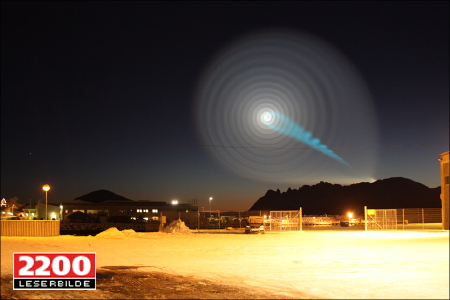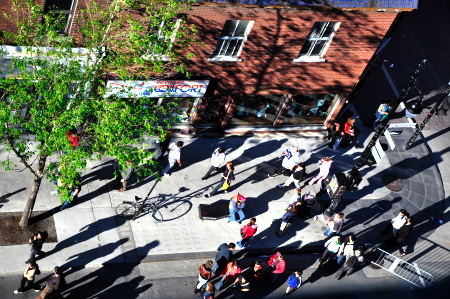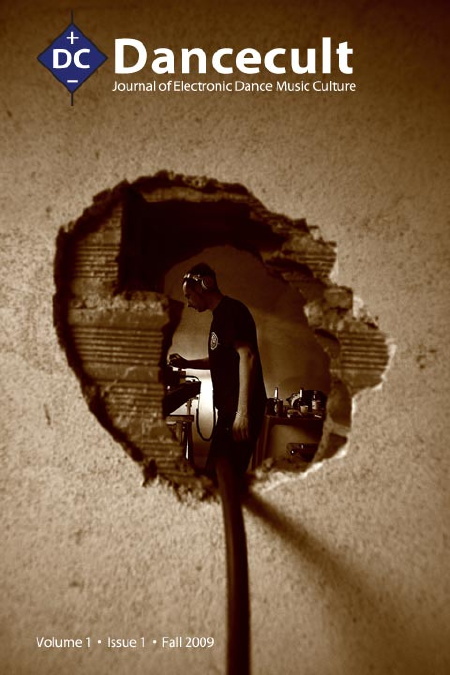As part of my recent research into the mechanics of dismissal – the ways in which dismissals operate as the modus operandi of precarious labour – I asked around the Facebook network for stories of gettin’ fired. And I was surprised by the response; a good number of friends & colleagues had at one time been ‘dismissed’ from their jobs. Their stories are self-explanatory. It would appear that in most cases, the managerial class deploys dismissal as a means to cover-up structural incompetence. In quite a few cases, employees were misled into short-term hirings; dismissal is an easy way to ignore labour law that protects employee rights.
business ontology (or why Xmas gets you fired)
December 29th, 2009 | 9 commentsA few days ago I was throwing down some conversation in a noisy bar with a colleague (and friend) whom I hadn’t seen in awhile. Besides being able to only interpret every fourth word or so due to a completely distracting mashup mix blaring on the system whilst downing a good number of beers, the question came up as to what I was reading, and I showed TH a copy of Precarious Rhapsody by Franco “Bifo” Berardi — a work of autonomist theory from the Italian camp. The reason I was reading this, I explained, was because it engaged me, enraptured me, and for good reason — every line appeared as a reflection of my own fractured experience, not only in the past year working the shop floor, but in my life of working within realms aptly described under the banner of cognitive labour. I had gone from being a wordsmith and arts worker to a member of the shop floor precariat, in short from one precarious realm to another, from a realm where 110% of the brain is owned (insofar as one’s future cognitive production is pre-owned) to a position in which the brain is not only disowned, but actively discouraged in its use, with the menial task of one’s labour, however useless or counterproductive, the only toil to be done. While working the shop floor, I also observed the incredible ineptitude of business management, as it sweated the small stuff, missed the bigger picture, accepted mediocrity from itself while demanding 24/7 availability from the minimum wagers. In short, working the floor demonstrated quite precisely the management-induced toxic atmosphere of insecurity, resulting in seasonal turnover, inexperienced decision-making, and overall bad biz.
sleeping with the enemy (embedded trauma)
December 15th, 2009 | 3 comments
truth in irony – whether beat down or beaten entirely / g20 protests, london
Since there are no remaining visible alternatives to universal pan-capitalism there seems to be no need for payoffs for the disenchanted, no necessity to bribe dissenting segments of the population and no incentives to grant extensions of freedoms. Instead of peddling hope and the vision of a mutually shared commonwealth, authority is maintained by synthetic fear and the need to secure property against some other. (“Synthetic Fear,” Konrad Becker, in Strategic Reality Dictionary: 144).
What is an anthronomics? Anthronomics would come to consist of embedded analysis. But literally: sleep with the enemy. Living the precarious wage as anthropology of the precariat. And plumbing the depths of the employer (or lack thereof). As a -nomics, a study of laws, it is yet a side-step from an economics which sees laws as relations of production, trade, and money, or in general of eco– principalities that become increasingly removed from affective conditions of collective bodies. An anthronomics puts the body back into the equation of economics, as well as the embedded status of its investigator, and like cultural ethnography, seeks to think through by thinking among.
anthronomics of the precariat
December 14th, 2009 | 9 comments
"Precarious" issue of MUTE (Vol.2 #0)
What are the characteristics of the precariat? When one outlines the precarious class it is often by way of emphasizing the importance of cognitive labour. But sometimes discussions of cognitive labour (or what is known, somewhat incorrectly, as “immaterial labour”) glance over what Brian Holmes calls “the flexible personality.” As Holmes writes of his essay (originally published in 2001), the world has now commenced the
full implementation of the flexible employment system, that is, of a labor regime in which worker mobility and variable hours are accompanied by continuous electronic surveillance and the managerial analysis of performance. (Holmes, Flexible Personality)
my precarious (Sputnik Sweeheart)
December 9th, 2009 | 3 commentsSo that’s the way we live our lives. No matter how deep and fatal the loss, no matter how important the thing that’s stolen from us – that’s snatched right out of our hands – even if we are left completely changed, with only the outer layer of skin from before, we continue to play out our lives this way, in silence. We draw ever nearer to the end of our allotted span of time, bidding it farewell as it trails off behind. Repeating, often adroitly, the endless deeds of the everyday. Leaving behind a feeling of immeasurable emptiness. (Murukami, Sputnik Sweeheart 207)
…and in the Norwegian night sky, a spiral, lighting the heavens for over two minutes, what is this strange sight…

"the mysterious lysfenomen"
What gains greater notice — this spiral or the infelicities of Tiger Woods? The media attention is resolutely focused on the AfroAmerican groin as usual; the strangeness of the night sky passes us unnoticed. Perhaps because it gestures not toward what we already know – that Tiger, like 99% of us, thinks the confines of marriage a sham, and that human life be too short to not divest it among many – but toward what we don’t know. This light, the sky, these are unassimilable objects. Though reported and noticed as they do not escape all perception (that which does passes us by without a trace — perhaps), such events constitute a counter-event. A slip within symbolic systems. Such slips make possible all kinds of escapes and exit strategies.
archiving disappearance (addendum)
November 25th, 2009 | 3 comments
find someone to hold hands with: remember this
Not posting here registers a kind of disappearance. Where have I gone? Am I working? What constitutes labour when it is non-present? Is a life unrecorded in the 21C a life lived? Does not the precariat, the precarious immaterial class, take as much time archiving as doing? What precisely is the measure of this distance between doing and recording, acting and archiving? A desire to be done with it, enough with it, competes against the same urge to document. We are all tourists now: tourists, becoming a tourist, was the first manifestation of pathological levels of documentation. All must be photographed, recorded; the lived experience is better — oh, but isn’t it — in the re-telling than the actuality. The banality of “postmodern” readings (and this remains the ugly legacy of postmodernism) celebrated the retelling over the actuality. What is the actuality? So easy to diss this concept of lived experience – but in the critical deconstruction of presence, what the imitators forgot was the actuality or lived experience of thinking without a master. Actuality is living without a master. Writing is living too — but without a master. The only master being the master to take apart within the self (yes: this be alterity, otherness). Postmodernism found the easy-way out by generating endless critique of the lived plenitude instead of seeking its own experience thereof. Lived experience as the repetition of plenitude and suffering is the basis of anarchic living: organisation without mastery. And this concept has much more to do with the deconstruction of presence than the mere dialectical reversal of retelling over doing.
How Not To Be Seen (v.1)
October 26th, 2009 | 6 commentsDisappearance as a strategy: to flee confinement by way of a slippage between sign and symbol. As enacted in space, through time. Rave culture enacts a level of disappearance, by slipping away from the usual concept of a counterculture’s visual opposition. The visual is switched for the sonic. The punk on the streetcorner for the raver in the warehouse. Rave culture switches day for night. It doesn’t disappear from the day as it was never there.
Dancecult: Journal of EDMC launches 1.1
September 28th, 2009 | 1 comment:: Fiends I am proud to present the first edition of ::
DANCECULT – JOURNAL OF ELECTRONIC DANCE MUSIC CULTURE
Including a piece of my own that recaps 10 years of MUTEK:
Convergence & Soniculture: 10 Years of MUTEK
| — > PDF < — | — > HTML < — |
&
.
Dancecult 1.1 2009 Contents:
http://dj.dancecult.net
Soul on Ice: the Afrofuturist Twist (rhythm III)
September 7th, 2009 | No comments yetIt was Chubby Checker’s mission, bearing the Twist as good news, to teach the whites, whom history had taught to forget, how to shake their asses again. It is a skill they surely must once have possessed but which they abandoned for puritanical dreams of escaping the corruption of the flesh, by leaving the terrors of the Body to the blacks. (Eldridge Cleaver, Soul on Ice: 174)
The writings of Eldridge Cleaver distort something of Cleaver’s usual image as a prison writer, Black Panther and ex-militant who found religion (though he is all of these things as well), for they also offer a different path into thinking Afrofuturism. Check out the quote above, collected in the prison writings of Soul on Ice. Afrofuturism as a philosopheme, a kind of protoza concept, is at work here. In Cleaver, the transformational potential of embodied rhythm is seen as not only part of a political critique, but an entire theory of embodied, near-Gnostic metaphysics, in which blacks and whites are long-separated entities, each requiring the other to achieve balance and harmony.
the city be the rhythm invisible (rhythm II)
August 31st, 2009 | 5 comments
in the shadows of the urban (I)_ MTL. photo: tV
Henri Lefebvre’s last work, published posthumously, and intriguing as it is something of a skeletal meditation, is entitled Rhythmanalysis. In it Lefebvre advances two hypotheses, each unique, urgent, and radical in scope. The first, following from The Urban Revolution, is that the engine of history, so to speak, is no longer the economic base, by which Lefebvre upends the Marxian hypothesis that the means of production drive the social production of history and class. Lefebvre instead posits the urban: the urban, in itself, constitutes a breakdown between city and country, between the means of production and the superstructure. The urban is a new, epochal and thus world historical condition – a virtual set of possibilities – encompassing the ‘urban revolution’, which for Lefebvre retains its open, virtual – and thus ateleological – futurity. This thesis, nascent in Lefebvre’s work of the early ’60s (and with the SI), comes into its own in Rhythmanalysis, wherein a second hypothesis takes shape: that the urban can be read, can be analysed, by a kind of phenomenology of rhythm, a phenomenology or psychoanalysis of the urban condition.
Unlike the sociological interpretation of Lefebvre – in which the ‘urban’ is seen as an architectural phenomena of the city’s expanse, of the suburb, and in which Lefebvre’s work is thus dated to the level of a (now dated) sociological fact – I am intrigued by the broader philosophical purchase of Lefebvre’s thought on the urban and rhythmanalysis.










 RT
RT 